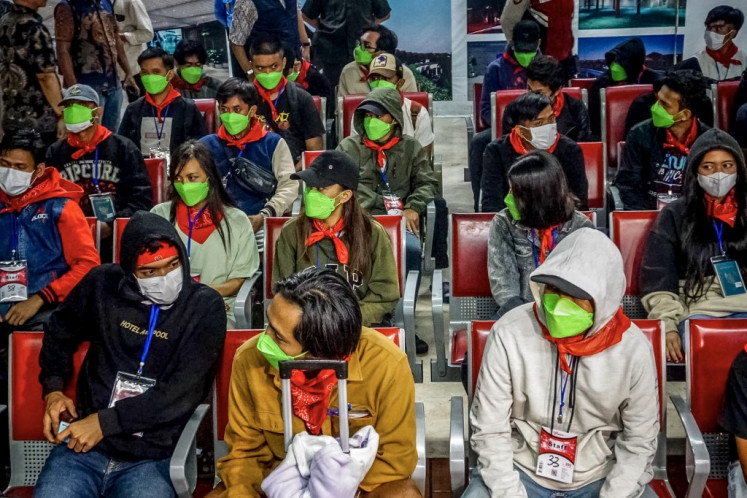Popular Reads
Top Results
Can't find what you're looking for?
View all search resultsPopular Reads
Top Results
Can't find what you're looking for?
View all search resultsIndonesian Muslims: Believers in Islam or cultural Muslims?
JP/Ganug Nugroho AdiIndonesia is the country with the largest Muslim population in the world and its society is tightly shaped by Islamic values
Change text size
Gift Premium Articles
to Anyone
JP/Ganug Nugroho Adi
Indonesia is the country with the largest Muslim population in the world and its society is tightly shaped by Islamic values. Despite numerous shortcomings, most Indonesian Muslims consider themselves believers in Islam.
Nevertheless, there is also significant evidence that indicates that most Indonesian Muslims are “cultural Muslims” rather than believers in Islam. The term “cultural Muslim” refers to a person who adopts a number of Islamic traditions in his life but lacks iman (faith), Islam’s fundamental value. While no one can assess the degree of faith held in another person’s heart, one can, however, compare the person’s actions to what is expected of him in Islam.
I will use two cases to explore the distinction between a Muslim believer and a cultural Muslim: the lack of sufficient Arabic language knowledge and the distinction between being born a Muslim and becoming a Muslim, a necessary process to become a believer.
What are the implications of the fact that most Indonesians do not speak Arabic? As Muslims, they are expected to believe that Allah created them and everything around them, and that He is the only true source for guidance in this life and in the hereafter. That nothing in our lives is possible without His consent and grace. To guide humans, Allah sent the Quran, the only infallible guide for humans until the Day of Judgment. In the Quran, Muslims can find guidance to successfully overcome all kinds of challenges — personal, social, economic, religious and so on.
This unique and precious source of guidance and success is, however, written in Arabic language and cannot be translated because it contains the words of Allah. Islamic scholars can make their own interpretation of the meanings of the Quran and share them in other languages.
These personal interpretations can be used by others as one of the sources of advice, but not as guidance. This is because each person will interpret the Quran in a different way, resulting in thousands or millions of interpretations. As a consequence, Muslims are not allowed to seek guidance from anyone besides Allah and His Messenger.
To explore what this situation implies when it comes to assessing whether a person is a believer or not, let us take the fictional case of Aisha, a French woman who recently converted to Islam and is visiting Indonesia. Her only shortcoming is that she cannot learn new languages. During her visit, she meets Nuruddin, a young Indonesian Muslim. With the help of a translator, Aisha and Nuruddin get to know each other well and Nuruddin introduces her to his family. The couple gets engaged and decides to get married after two years.
Aisha goes back to France to finish her studies and every day she writes one or two letters to her future husband — in French, of course. Hence, each time Nuruddin receives her letters and he replies to them, he has to find a translator. So, he learns French to be able to directly communicate and understand Aisha, and to be able to build a strong relationship with her.
Thus Muslims find themselves in a situation similar to Nuruddin with his French fiancé, which resulted in him not having any other option than to learn French. If Muslims want to find out how to be successful in this life and in the hereafter, they must learn Arabic if they do not have any impediment to do so. There is no alternative to this.
It is deeply inconsistent to declare that one believes in Allah and the Quran, but then does not make the minimal effort to learn the language that is the key to access Allah’s guidance. This same person finds the time and energy to learn all kinds of other languages, skills and worldly knowledge that have only very limited value in the material life.
More surprisingly, this person who might “read” and “recite” the Quran multiple times during his daily prayers, does not seem to be bothered by the fact that he does not understand the meaning and value of the precious words he is uttering. Knowing that the person has no impediment whatsoever to learn Arabic, wouldn’t you be surprised by the fact he is not learning it? And when an entire community follows this pattern of not learning Arabic, wouldn’t you question the degree of belief found in the entire community?
Now, let’s explore the difference between being born a Muslim and becoming one. When asked why they consider themselves Muslims, the large majority of Indonesian Muslims reply that it is because they were born into a Muslim family. Well, being born a Muslim does not imply that one is a Muslim.
Everyone who wants to be a Muslim must take the initiative and go through the struggle of becoming a Muslim first. That is, to learn and to question everything, to think and think again, slowly digesting what Islam means and what it implies to be a Muslim. This cannot be achieved by birth. This is a life-long struggle full of ups and downs, successes and failures. And what is the source of the knowledge that needs to be “digested” to become a Muslim? The original Quran in Arabic, not the interpretations of scholars.
The fact that Indonesian Muslims overwhelmingly do not speak Arabic and have not been through the necessary process of becoming a Muslim strongly undermines their claim that they are believers in Allah and His Book. If most of them were believers, wouldn’t it be reflected in the type of society they have built? Would an authentic Islamic society be plagued by high levels of social inequality and corruption, an education system and government suffering of weak ethics, discipline and critical thinking?
Ultimately, it is up to the Indonesian Muslims to ponder about these issues and honestly decide if they are “living” Islam as believers should or “wearing” Islam as cultural Muslims do.
_________________
New America Security fellow and visiting professor at Muhammadiyah University of Yogyakarta (UMY), with a PhD in politics and international studies with concentration on Muslim-government relations.










